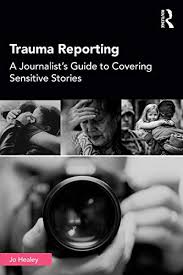
As the John Schofield Trust (JST) approaches the 25th anniversary of John’s death in Croatia and in the midst of a global pandemic, it seemed entirely fitting that we focused our most recent masterclass on the subject of dealing sensitively with the bereaved or distressed.
After John died, the JST founder, Susie Schofield, found herself shocked by the lack of sensitivity of some reporters. As she remarked wryly ahead of the masterclass: ‘My favourite approach was the bunch of flowers from a newspaper with “Give us an interview” written on the accompanying card.’
 Jo Healey, the author of Reporting Trauma: A Journalist’s Guide to Covering Sensitive Stories has been a TV and radio reporter for three decades. For the book, she approached bereaved families and asked them about their experiences of media attention and specifically about what had worked and what hadn’t. Jo’s session was, therefore, full of practical, relevant tips on how to be trauma informed.
Jo Healey, the author of Reporting Trauma: A Journalist’s Guide to Covering Sensitive Stories has been a TV and radio reporter for three decades. For the book, she approached bereaved families and asked them about their experiences of media attention and specifically about what had worked and what hadn’t. Jo’s session was, therefore, full of practical, relevant tips on how to be trauma informed.
‘Honesty, acknowledgement, accuracy consent, control, compassion’
For Jo, interviewing the bereaved and vulnerable is not about holding someone to account; it is about hearing their account.
Six things are critical to a sensitive interview. The honesty of the reporter in all their dealings with the bereaved. Acknowledgment of what has happened – as one of the parents Jo interviewed for her book put it: it is ‘the simple sorry that makes it so much easier to move forward’. Accuracy – small mistakes about names or age can really hurt. It’s also important to manage expectations honestly so the person being interviewed is really clear about the consent they are giving. Try to give control to the person disempowered through trauma. It could be letting them choose the pictures used or talking though what the questions are likely to be. How you communicate, build rapport and show compassion can make a lot of difference to the interview. Jo stressed the need to listen and not be distracted by pressures from an editor or what might be happening back in the newsroom. A good relationship with your subject will make for better access and a better report.
Trauma is exhausting
Jo stressed the need for careful preparation ahead of an interview; taking your time and speaking slowly as the person being interviewed may be in a state of shock. Trauma is exhausting. Make sure your whole team is trauma informed; loose words from another on the team can set you back. Make sure everyone knows what’s coming: off the cuff questions can really add to the stress of the grieving or traumatised.
What to avoid
Don’t ask questions such as ‘how did it feel?’ The ‘when’ question is more likely to lead to powerful storytelling. The families Jo interviewed for her book were clear about the things they hated the media doing: being too brisk; being bossy; they said it was easy to spot when someone was being fake. Lifting photos and clips from social media can be hurtful to families and don’t be afraid to go back and check facts. Better to check than make mistakes. But if you do make a mistake, acknowledge and apologise.
Before you end the interview
Make sure you bring someone back to the present and check they have support in place – particularly important currently when you might be interviewing someone remotely. Don’t forget to thank them and make sure they are clear when, how and where the piece will be broadcast or published.
Above all, Jo said remember you are both human and reporter and treat your interviewees as people not as victims.
How to protect yourself
There was a lot to reflect on in Jo’s session and she also stressed the importance of self-care when covering sensitive stories. It is normal to be affected by listening and witnessing the sorrow of others, but some things can help you protect yourself:
- the social structure of a team is really important
- take time to talk to your editors and trusted colleagues or friends about what you have experienced
- look after yourself physically – that means enough sleep; eating properly and exercise – these will all help you protect yourself when you are covering distressing stories.
